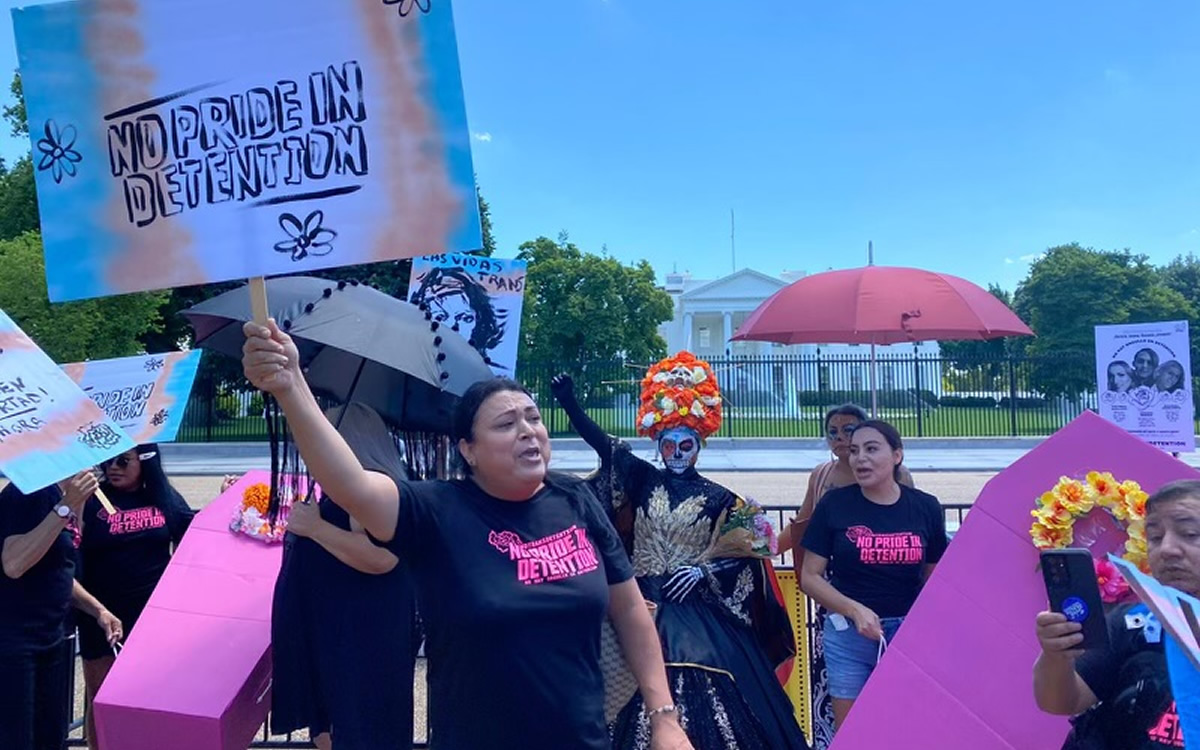National
LGBTQ asylum seekers, migrants brace for second Trump administration
Incoming president has promised ‘mass deportations’

Advocacy groups in the wake of President-elect Donald Trump’s election fear his administration’s proposed immigration policies will place LGBTQ migrants and asylum seekers at increased risk.
“What we are expecting again is that the new administration will continue weaponizing the immigration system to keep igniting resentment,” Abdiel Echevarría-Cabán, an immigration lawyer who is based in Texas’s Rio Grande Valley, told the Washington Blade.
Trump during the campaign pledged a “mass deportation” of undocumented immigrants.
The president-elect in 2019 implemented the Migrant Protection Protocols program — known as the “Remain in Mexico” policy — that forced asylum seekers to pursue their cases in Mexico.
Advocates sharply criticized MPP, in part, because it made LGBTQ asylum seekers who were forced to live in Tijuana, Ciudad Juárez, Matamoros, and other Mexican border cities even more vulnerable to violence and persecution based on their gender identity and sexual orientation.
The State Department currently advises American citizens not to travel to Tamaulipas state in which Matamoros is located because of “crime and kidnapping.” The State Department also urges American citizens to “reconsider travel” to Baja California and Chihuahua states in which Tijuana and Ciudad Juárez are located respectively because of “crime and kidnapping.”
The Biden-Harris administration ended MPP in 2021.
The Centers for Disease Control and Prevention in March 2020 implemented Title 42, which closed the Southern border to most asylum seekers and migrants because of the COVID-19 pandemic. The policy ended in May 2023.
Robert Contreras, president of Bienestar Human Services, a Los Angeles-based organization that works with Latino and LGBTQ communities, in a statement to the Blade noted Project 2025, which “outlines the incoming administration’s agenda, proposes extensive rollbacks of rights and protections for LGBTQ+ individuals.”
“This includes dismantling anti-discrimination protections, restricting access to gender-affirming healthcare, and increasing immigration enforcement,” said Contreras.
Trans woman in Tijuana nervously awaits response to asylum application
A Biden-Harris administration policy that took place in May 2023 says “noncitizens who cross the Southwest land border or adjacent coastal borders without authorization after traveling through another country, and without having (1) availed themselves of an existing lawful process, (2) presented at a port of entry at a pre-scheduled time using the CBP (U.S. Customs and Border Protection) One app, or (3) been denied asylum in a third country through which they traveled, are presumed ineligible for asylum unless they meet certain limited exceptions.” The exceptions under the regulation include:
- They were provided authorization to travel to the United States pursuant to a DHS-approved parole process;
- They used the CBP One app to schedule a time and place to present at a port of entry, or they presented at a port of entry without using the CBP One app and established that it was not possible to access or use the CBP One app due to a language barrier, illiteracy, significant technical failure, or other ongoing and serious obstacle; or
- They applied for and were denied asylum in a third country en route to the United States.
Biden in June issued an executive order that prohibits migrants from asking for asylum in the U.S. if they “unlawfully” cross the Southern border.
The Organization for Refuge, Asylum and Migration works with LGBTQ migrants and asylum seekers in Tijuana, Mexicali and other Mexican border cities.
ORAM Executive Director Steve Roth is among those who criticized Biden’s executive order. Roth told the Blade the incoming administration’s proposed policies would “leave vulnerable transgender people, gay men, lesbians, and others fleeing life-threatening violence and persecution with little to no opportunity to seek asylum in the U.S. stripped of safe pathways.”
“Many will find themselves stranded in dangerous regions like the Mexico-U.S. border and transit countries around the world where their safety and well-being will be further jeopardized by violence, exploitation, and a lack of support,” he said.
Jennicet Gutiérrez, co-executive director of Familia: TQLM, an organization that advocates on behalf of transgender and gender non-conforming immigrants, noted to the Blade a trans woman who has asked for asylum in the U.S. “has been patiently waiting in Tijuana” for more than six months “for her CBP One application response.”
“Now she feels uncertain if she will ever get the chance to cross to the United States,” said Gutiérrez.
She added Trump’s election “is going to be devastating for LGBTQ+ asylum seekers.”
“Transgender migrants are concerned about the future of their cases,” said Gutiérrez. “The upcoming administration is not going to prioritize or protect our communities. Instead, they will prioritize mass deportations and incarceration.”

TransLatin@ Coalition President Bamby Salcedo echoed Gutiérrez.
“Trans people who are immigrants are getting the double whammy with the new administration,” Salcedo told the Blade. “As it is, trans people have been political targets throughout this election. Now, with the specific target against immigrants, trans immigrants will be greatly impacted.”
‘We’re ready to keep fighting’
Trans Queer Pueblo is a Phoenix-based organization that provides health care and other services to undocumented LGBTQ immigrants and migrants of color. The group, among other things, also advocates on behalf of those who are in U.S. Immigration and Customs Enforcement detention centers.
“We refuse to wait for politicians to change systems that were designed to hurt us,” Trans Queer Pueblo told the Blade in a statement. “The elections saw both political parties using our trans and migrant identities as political pawns.”
Trans Queer Pueblo acknowledged concerns over the incoming administration’s immigration policies. It added, however, Arizona’s Proposition 314 is “our biggest battle.”
Arizona voters last month approved Proposition 314, which is also known as the Secure the Border Act.
Trans Queer Pueblo notes it “makes it a crime for undocumented people to exist anywhere, with arrests possible anywhere, including schools and hospitals.” The group pointed out Proposition 314 also applies to asylum seekers.
“We are building a future where LGBTQ+ migrants of color can live free, healthy, and secure, deciding our own destiny without fear,” Trans Queer Pueblo told the Blade. “This new administration will not change our mission — we’re ready to keep fighting.”
Contreras stressed Bienestar “remains committed to advocate for the rights and safety of all migrants and asylum seekers.” Gutiérrez added it is “crucial for LGBTQ+ migrants to know that they are not alone.”
“We will continue to organize and mobilize,” she said. “We must resist unjust treatments and laws.”
Federal Government
UPenn erases Lia Thomas’s records as part of settlement with White House
University agreed to ban trans women from women’s sports teams

In a settlement with the Trump-Vance administration announced on Tuesday, the University of Pennsylvania will ban transgender athletes from competing and erase swimming records set by transgender former student Lia Thomas.
The U.S. Department of Education’s Office for Civil Rights found the university in violation of Title IX, the federal rights law barring sex based discrimination in educational institutions, by “permitting males to compete in women’s intercollegiate athletics and to occupy women-only intimate facilities.”
The statement issued by University of Pennsylvania President J. Larry Jameson highlighted how the law’s interpretation was changed substantially under President Donald Trump’s second term.
“The Department of Education OCR investigated the participation of one transgender athlete on the women’s swimming team three years ago, during the 2021-2022 swim season,” he wrote. “At that time, Penn was in compliance with NCAA eligibility rules and Title IX as then interpreted.”
Jameson continued, “Penn has always followed — and continues to follow — Title IX and the applicable policy of the NCAA regarding transgender athletes. NCAA eligibility rules changed in February 2025 with Executive Orders 14168 and 14201 and Penn will continue to adhere to these new rules.”
Writing that “we acknowledge that some student-athletes were disadvantaged by these rules” in place while Thomas was allowed to compete, the university president added, “We recognize this and will apologize to those who experienced a competitive disadvantage or experienced anxiety because of the policies in effect at the time.”
“Today’s resolution agreement with UPenn is yet another example of the Trump effect in action,” Education Secretary Linda McMahon said in a statement. “Thanks to the leadership of President Trump, UPenn has agreed both to apologize for its past Title IX violations and to ensure that women’s sports are protected at the university for future generations of female athletes.”
Under former President Joe Biden, the department’s Office of Civil Rights sought to protect against anti-LGBTQ discrimination in education, bringing investigations and enforcement actions in cases where school officials might, for example, require trans students to use restrooms and facilities consistent with their birth sex or fail to respond to peer harassment over their gender identity.
Much of the legal reasoning behind the Biden-Harris administration’s positions extended from the 2020 U.S. Supreme Court case Bostock v. Clayton County, which found that sex-based discrimination includes that which is based on sexual orientation or gender identity under Title VII rules covering employment practices.
The Trump-Vance administration last week put the state of California on notice that its trans athlete policies were, or once were, in violation of Title IX, which comes amid the ongoing battle with Maine over the same issue.
New York
Two teens shot steps from Stonewall Inn after NYC Pride parade
One of the victims remains in critical condition

On Sunday night, following the annual NYC Pride March, two girls were shot in Sheridan Square, feet away from the historic Stonewall Inn.
According to an NYPD report, the two girls, aged 16 and 17, were shot around 10:15 p.m. as Pride festivities began to wind down. The 16-year-old was struck in the head and, according to police sources, is said to be in critical condition, while the 17-year-old was said to be in stable condition.
The Washington Blade confirmed with the NYPD the details from the police reports and learned no arrests had been made as of noon Monday.
The shooting took place in the Greenwich Village neighborhood of Manhattan, mere feet away from the most famous gay bar in the city — if not the world — the Stonewall Inn. Earlier that day, hundreds of thousands of people marched down Christopher Street to celebrate 55 years of LGBTQ people standing up for their rights.
In June 1969, after police raided the Stonewall Inn, members of the LGBTQ community pushed back, sparking what became known as the Stonewall riots. Over the course of two days, LGBTQ New Yorkers protested the discriminatory policing of queer spaces across the city and mobilized to speak out — and throw bottles if need be — at officers attempting to suppress their existence.
The following year, LGBTQ people returned to the Stonewall Inn and marched through the same streets where queer New Yorkers had been arrested, marking the first “Gay Pride March” in history and declaring that LGBTQ people were not going anywhere.
New York State Assemblywoman Deborah Glick, whose district includes Greenwich Village, took to social media to comment on the shooting.
“After decades of peaceful Pride celebrations — this year gun fire and two people shot near the Stonewall Inn is a reminder that gun violence is everywhere,” the lesbian lawmaker said on X. “Guns are a problem despite the NRA BS.”
New York
Zohran Mamdani participates in NYC Pride parade
Mayoral candidate has detailed LGBTQ rights platform

Zohran Mamdani, the candidate for mayor of New York City who pulled a surprise victory in the primary contest last week, walked in the city’s Pride parade on Sunday.
The Democratic Socialist and New York State Assembly member published photos on social media with New York Attorney General Letitia James, telling followers it was “a joy to march in NYC Pride with the people’s champ” and to “see so many friends on this gorgeous day.”
“Happy Pride NYC,” he wrote, adding a rainbow emoji.
Mamdani’s platform includes a detailed plan for LGBTQ people who “across the United States are facing an increasingly hostile political environment.”
His campaign website explains: “New York City must be a refuge for LGBTQIA+ people, but private institutions in our own city have already started capitulating to Trump’s assault on trans rights.
“Meanwhile, the cost of living crisis confronting working class people across the city hits the LGBTQIA+ community particularly hard, with higher rates of unemployment and homelessness than the rest of the city.”
“The Mamdani administration will protect LGBTQIA+ New Yorkers by expanding and protecting gender-affirming care citywide, making NYC an LGBTQIA+ sanctuary city, and creating the Office of LGBTQIA+ Affairs.”
-

 U.S. Supreme Court5 days ago
U.S. Supreme Court5 days agoSupreme Court upholds ACA rule that makes PrEP, other preventative care free
-

 U.S. Supreme Court5 days ago
U.S. Supreme Court5 days agoSupreme Court rules parents must have option to opt children out of LGBTQ-specific lessons
-

 Television5 days ago
Television5 days ago‘White Lotus,’ ‘Severance,’ ‘Andor’ lead Dorian TV Awards noms
-

 Music & Concerts5 days ago
Music & Concerts5 days agoBerkshire Choral to commemorate Matthew Shepard’s life











